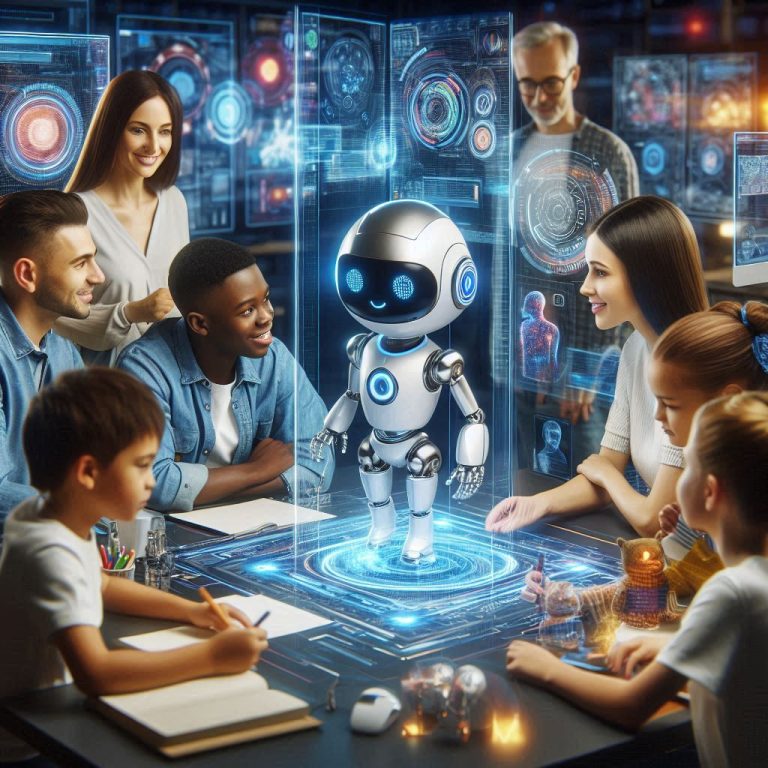
Artificial Intelligence (AI) has transcended its nascent stage, becoming a pivotal force across various sectors. The relentless evolution of AI trends and developments has captured the imagination of technologists, businesses, and policymakers alike. In this comprehensive analysis, we delve into the most significant advancements shaping the AI landscape, offering insights into the transformative impact these innovations are likely to have.
The Ascendancy of Generative AI
One of the most compelling AI trends and developments of recent years is the rise of Generative AI. This technology encompasses algorithms that generate new content—be it text, images, or even music—by learning from vast datasets. Unlike traditional AI models that merely analyze data, Generative AI creates novel outputs based on learned patterns.
Key Developments
- Natural Language Processing (NLP) Enhancements: Generative AI models such as OpenAI’s GPT series have revolutionized NLP by generating human-like text that can be used in various applications from chatbots to creative writing.
- Deep Learning Techniques: Advances in deep learning have enabled more sophisticated content generation, improving coherence and relevance in generated text.
- Multimodal Capabilities: Modern Generative AI is not limited to text. It now integrates with image and video generation, enhancing creative processes across multiple mediums.
AI in Healthcare: Precision and Personalization
Healthcare is another domain experiencing profound transformation through AI trends and developments. AI applications in healthcare are advancing towards more personalized and precise medical interventions.
Key Developments
- Predictive Analytics: AI algorithms analyze patient data to predict disease outbreaks and individual health risks, enabling proactive medical care.
- Personalized Medicine: AI is helping tailor treatments based on individual genetic profiles, optimizing efficacy and minimizing adverse effects.
- Medical Imaging: Enhanced image recognition capabilities are improving diagnostic accuracy, with AI systems able to identify anomalies in medical scans with high precision.
The Evolution of Autonomous Systems
Autonomous systems, including self-driving cars and drones, are at the forefront of AI trends and developments. These systems leverage AI to operate independently, performing tasks without direct human intervention.
Key Developments
- Enhanced Sensor Integration: Advances in sensor technology and data fusion have improved the safety and reliability of autonomous vehicles.
- Real-time Decision Making: AI systems now make split-second decisions based on real-time data, improving navigation and response to environmental changes.
- Regulatory Frameworks: As autonomous systems become more prevalent, regulatory bodies are developing guidelines to ensure safety and ethical standards.
AI and Cybersecurity: Defending the Digital Frontier
The intersection of AI and cybersecurity is a critical area of focus within AI trends and developments. As cyber threats become more sophisticated, AI plays a crucial role in both defense and offense.
Key Developments
- Threat Detection: AI algorithms identify patterns and anomalies indicative of potential cyber threats, enabling quicker response to security breaches.
- Automated Response Systems: AI-driven systems can automatically respond to threats, mitigating damage and reducing the need for human intervention.
- Ethical Considerations: The use of AI in cybersecurity raises ethical questions about privacy and surveillance, prompting discussions on responsible AI deployment.
AI and Environmental Sustainability
The application of AI in environmental sustainability is an emerging trend with significant potential. AI technologies are being employed to address various environmental challenges and promote sustainable practices.
Key Developments
- Climate Modeling: AI enhances the accuracy of climate models, providing better predictions and insights into climate change impacts.
- Energy Management: AI systems optimize energy consumption in buildings and industrial processes, reducing waste and lowering carbon footprints.
- Biodiversity Monitoring: AI assists in tracking and preserving wildlife by analyzing data from sensors and cameras to monitor animal populations and habitats.
The Role of Explainable AI
As AI systems become more complex, the need for explainable AI (XAI) is growing. XAI refers to AI models that provide transparent and understandable explanations for their decisions and actions.
Key Developments
- Transparency Tools: Development of tools that make AI decision-making processes more interpretable to users and stakeholders.
- Regulatory Requirements: Increasing demand for explainability due to regulatory pressures and ethical considerations, ensuring that AI systems operate transparently and fairly.
- User Trust: Explainable AI enhances user trust by clarifying how AI systems arrive at their conclusions, which is essential for adoption in sensitive areas such as finance and healthcare.
AI in Education: Transforming Learning Environments
The educational sector is experiencing a shift due to AI trends and developments, with AI being used to enhance learning experiences and administrative efficiency.
Key Developments
- Adaptive Learning Platforms: AI-driven platforms personalize learning experiences based on individual student needs and performance.
- Automated Administrative Tasks: AI systems automate administrative functions such as grading and scheduling, allowing educators to focus more on teaching.
- Virtual Classrooms: AI facilitates virtual learning environments, providing interactive and engaging experiences for students.
The Future of AI: Predictions and Challenges
Looking ahead, the future of AI holds both exciting possibilities and formidable challenges. Understanding these aspects is crucial for navigating the evolving landscape of AI trends and developments.
Key Predictions
- Increased Integration: AI will become more integrated into everyday applications, making it a ubiquitous presence in personal and professional domains.
- Ethical and Social Implications: As AI technology advances, ethical considerations and societal impacts will require ongoing scrutiny and management.
- Collaborative AI: Future AI systems will increasingly collaborate with humans, enhancing productivity and innovation across various fields.
Conclusion
The realm of AI is evolving at an unprecedented pace, with numerous AI trends and developments shaping the future. From Generative AI and autonomous systems to applications in healthcare and cybersecurity, these advancements promise to revolutionize industries and everyday life. Staying informed about these trends is essential for leveraging AI’s potential and addressing the associated challenges.
As AI continues to advance, the importance of ethical considerations and regulatory frameworks will become increasingly apparent. Embracing these changes with a thoughtful approach will ensure that the benefits of AI are maximized while mitigating potential risks.




